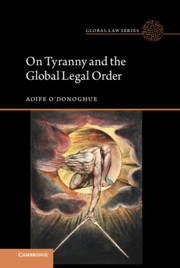Book contents
- On Tyranny and the Global Legal Order
- Global Law Series
- On Tyranny and the Global Legal Order
- Copyright page
- Dedication
- Dedication
- Contents
- Acknowledgements
- Introduction
- 1 A History of Tyranny
- 2 A Taxonomy of Tyranny
- 3 Tyrannicide, Tyrannophobia and Tyrannophilia
- 4 Scale, Tyranny and the Global Legal Order
- 5 Imperialism, Tyranny and the Global Legal Order
- Conclusion
- Bibliography
- Index
Conclusion
Tyranny and the Global Legal Order
Published online by Cambridge University Press: 24 September 2021
- On Tyranny and the Global Legal Order
- Global Law Series
- On Tyranny and the Global Legal Order
- Copyright page
- Dedication
- Dedication
- Contents
- Acknowledgements
- Introduction
- 1 A History of Tyranny
- 2 A Taxonomy of Tyranny
- 3 Tyrannicide, Tyrannophobia and Tyrannophilia
- 4 Scale, Tyranny and the Global Legal Order
- 5 Imperialism, Tyranny and the Global Legal Order
- Conclusion
- Bibliography
- Index
Summary
Across the works of William Blake Urizen is at once Jupiter, Jehovah, an Assyrian warrior and George III.1 Urizen uses guises of temperance, prudence, justice, fortitude and, occasionally, madness, to preserve his power.2 Urizen employs an array of tyrannical techniques but in each manifestation is a tyrant. Orc confronts Urizen in each of these guises, challenging tradition and nostalgia with revolution and revival. But the cycle of tyranny and tyrannicide must end, and we only find a resolution in a new order unrestrained by nostalgia for former tyrannical structures. Nostalgia for a history ensconced in authority and power must be replaced by a broad and complex public sphere filled with contestation and a governance order that heeds and responds to those it governs. To end Urizen’s tyrannical authority, we must pose unaskable questions. This book has therefore posed one such question: does tyranny lurk within the global legal order? The answer is yes. International law is not uniquely immune from tyranny. But having made that determination, international law must remove itself from any nostalgia for its (tyrannical) past and entrench contestation into a novel structure that takes both the scale(s) of its operation and its embeddedness into the everyday lives of individuals as fundamental to its self-understanding.
Keywords
- Type
- Chapter
- Information
- On Tyranny and the Global Legal Order , pp. 217 - 222Publisher: Cambridge University PressPrint publication year: 2021

